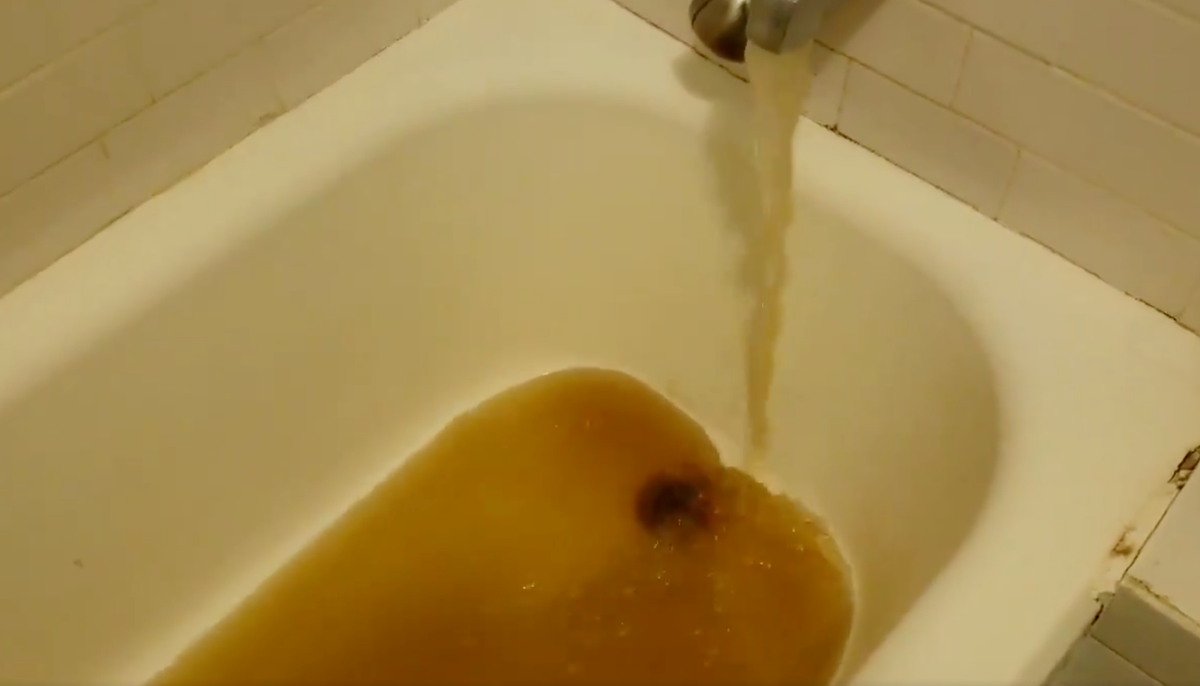Dirty, Brown Water From Your Faucet? Report it to 311!

FLATBUSH – Assemblywoman Rodneyse Bichotte, who has been speaking in support of tenants for years, is now advocating for clean water in her own apartment building, which contains 65 units.
Last week, Bichotte, who represents the 42nd Assembly district, went on to Twitter to share a video of dirty, brown water running through her bathroom faucets. She wrote, “This is what I deal w very often in my apartment. It’s hard 2 shower or brush my teeth, let alone drink water. #cleanwater is a human, & a living thing right!”
Am Bichotte – definitely want to have our team investigate. Please DM or email address and further details. For the record, @NYCWater has no similarities to Flint, MI. We test our water 600k+/yr and exceed all State and Fed standards. But definitely want to help you resolve!
— Michael DeLoach (@MichaelDeLoach) January 6, 2019
She then wrote #flintwater, referring to the awful water conditions in Flint, Michigan. The situation in Bichotte’s apartment, and other apartments that experience the same issue is likely to be completely different.
Sometimes referred to as the “champagne of drinking water,” New York City’s tap water is generally of very good quality. Collected in protected reservoirs up in the Catskill Mountains and Hudson Valley, the water travels downhill through large Aqueducts to the border of NYC and enters the City through three tunnels. Water samples are tested every day and the NYC Department of Environmental Protection (DEP) tells us that the water is tested more than 650,000 times annually. (To know more about the water process, check out this NY Times report. The City has also spent over $1 billion protecting its water system, the NY Times reported.)
Deputy commissioner at the DEP Michael DeLoach responded to Bichotte’s tweet saying he wants his team to investigate, also citing that NYC water is completely different than the Flint crisis.
“Our situation may not be a #flintwater [issue] but it’s [an] issue on our infrastructure and reminds us of #FlintWaterCrisis. We need to upgrade,” Bichotte said. “It happens often for me. I just have been silent for a long time.”
It is not yet clear what caused the dirty water in the Assemblywoman’s apartment. The DEP investigated the water on January 6 by opening a fire hydrant to flush the water in the water main outside her building (which is how the brown water issue is usually resolved). The next day, the superintendent contacted them letting DEP know that water in the building was running normally.
Bichotte is certain that this is a stop-gap measure and that the brown water will be back again – it has already happened several times this past year. She told Bklyner she used to call her super when the water was running brown and was told to let the water run, and after 15 minutes, the color would be back to normal, but when it happened again early this week, she’d enough.
Instead of calling her super, she called the DEP and tweeted about it. “I got at least three to four responses from people from every neighborhood group saying this happened to them, too,” Bichotte said.
“The solution to this is cleaner, better infrastructure,” she said. “Any child can turn on the water and just start drinking it.”
The DEP says that “While it is not harmful, residents should not drink obviously discolored water.”
The discolored water is “likely due to plumbing corrosion problems inside buildings and from rusting hot water heaters,” DEP said. Basically – if people have ongoing problems with brown water, then it is probably due to rusty pipes in their buildings. But – it could also be nearby construction, and that we have a lot if in Brooklyn. “But whatever the reason is, it shouldn’t be,” Bichotte said.
If tenants do experience discolored water, the DEP suggests calling 311. “This allows DEP to immediately investigate and ensure every resident is getting the best water possible,” they said.
The DEP says that in the last three years, there have been no other complaints (to 311 or DEP) of discolored water coming from Assemblywoman’s building. And in the last three years, there has been just one other complaint of discolored water for the entire block ranging from E 26th Street from Farragut Road to Glenwood Road. According to Bichotte, many people just let the water run until it’s normal again; many people don’t call 311.
“Many things are close to home. Sometimes we are oblivious to the socio-economic injustices occurring every day right under our noses,” she said. “The important thing is when we are finally aware of the situations at hand, we as citizens of society should take part in doing something about it.”



